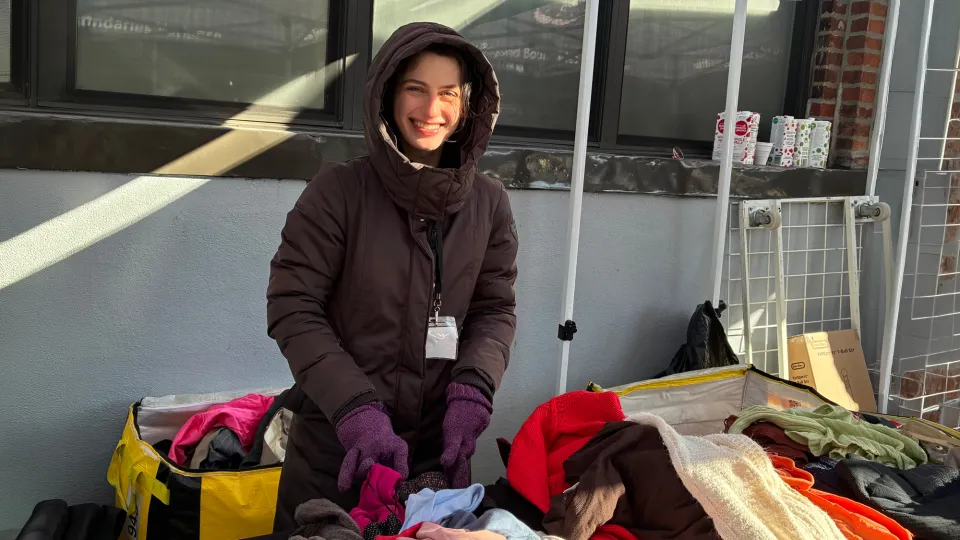Feature
Graduate Student Researchers Win 2023 Marmur Award
April 20, 2023
Einstein scientists gathered on March 20 to celebrate the four winners of the annual Julius Marmur Award. Einstein's Graduate Programs in the Biomedical Sciences present the award each year to a select group of Ph.D. students in recognition of their exceptional contributions to research.
The four scientists presented their work during a morning awards ceremony, and four past winners of the Marmur prize were featured at an afternoon career panel.
“To be chosen for this award is a distinctive honor,” said Victoria Freedman, Ph.D., associate dean for graduate programs in biomedical sciences. The prize was established 27 years ago in memory of pioneering molecular biologist Julius Marmur, Ph.D., who developed the first method to isolate highly purified and high-quality DNA. He was a member of Einstein’s faculty for 33 years until his death in 1996. “Dr. Marmur was an exceptional mentor who brought 20th century understanding of molecular biology to students, and he was very supportive, always encouraging us to aim for the highest scientific goals,” Dr. Freedman said.
2023 Marmur Awardees
This year’s winners represent a range of basic science fields.

Lindsay Gurska, Ph.D. ’23, was recognized for her research of blood cancers. She and colleagues found that crizotinib, a drug approved for non-small cell lung cancer, can suppress aberrant signaling in cells of patients with myeloproliferative neoplasm (MPN), setting the framework for initiating clinical testing of crizotinib for MPN patients. Her work has led to several awards, including the American Society of Hematology Abstract Achievement Award, and she was first author on a paper published in Clinical Cancer Research.
Dr. Gurska’s mentor is Kira Gritsman, M.D., Ph.D., associate professor of oncology, of medicine, and of cell biology at Einstein and co-leader of the Stem Cell & Cancer Biology Program at Montefiore Einstein Cancer Center.
“Being selected for the Marmur Award provides me with yet another opportunity to share our important research findings with the scientific and clinical community,” Dr. Gurska said. “Having spent five years at Einstein, I recognize that these opportunities are extremely valuable, bringing our findings one step closer to helping the MPN patient population.”
Dr. Gurska is a manager of the hematology/oncology team within the scientific affairs department at PRIME Education, a continuing medical education company.

Gregory Krause, M.D./Ph.D. candidate, was honored for his thesis work describing the molecular regulation and physiological relevance of endosomal microautophagy, a selective protein degradation pathway used by cells. Mr. Krause’s mentor is Ana Maria Cuervo, M.D., Ph.D., professor of developmental and molecular biology, of medicine, the Robert and Renée Belfer Chair for the Study of Neurodegenerative Diseases, and co-director of the Institute for Aging Research at Einstein.
In addition to his work in the lab, Mr. Krause has worked at the Continuity Clinic, an ambulatory outpatient facility run by the Medical Student Training Program at Einstein; was a member of the medical education executive committee; and volunteered in the pathology department at Montefiore during the COVID-19 pandemic. He plans to complete his residency training in neurology and pursue a career in academic medicine.
“The Marmur symposium is always an exciting time where we get to see some of the groundbreaking research that is happening at Einstein,” he said. “It is an honor both to be selected for this prestigious award and to be able to share my work with the Einstein community. I have been privileged to know some of the previous Marmur awardees, and I am humbled to be acknowledged alongside them.”

Emilio Merheb, Ph.D. ’23, was recognized for research into the mechanism of a rare neurodegenerative disease, Pol III-related Leukodystrophy. By engineering the first animal model of the disease, he found that pathogenic mutations in the largest subunit of RNA Polymerase III genes lead to defects in oligodendrocytes, the myelin-synthesizing cells of the central nervous system.
He presented his work at several conferences, including the OddPols International Conference on Transcriptional Mechanism and Regulation and Society of Neuroscience (SfN). Dr. Merheb’s mentor is Ian Willis, Ph.D., professor of biochemistry and of systems & computational biology at Einstein.
“I am truly honored and humbled to have been selected for this prestigious award,” Dr. Merheb said. “This body of work could not have been done without the excellent mentorship I received, the support and guidance of my advisory and thesis committee members, and the collaborations established throughout the years. It truly speaks to the environment that Einstein offers. It is a great place for both scientific and personal growth.”
During his time at Einstein, Dr. Merheb has served in many leadership roles, including as graduate student council co-chair, senate council student representative, 2023 Ph.D. class representative, and a peer mentor in the office of academic support and counseling. He received the Graduate Student Service Award in 2021.
Dr. Merheb is a senior research associate at the Diabetes, Obesity & Metabolism Institute (DOMI) at the Icahn School of Medicine at Mount Sinai.

Yacoba V.T. Minnow, Ph.D. ’23, was honored for her work on discovering transition state analogs—tight-binding enzyme inhibitors—for use as novel antimalarial therapeutics to combat the emerging resistance to current treatments.
In findings that could aid efforts to combat drug-resistant malaria, Dr. Minnow also identified malaria resistance biomarkers in the parasite. Her research has led to an Editor’s Pick article in the Journal of Biological Chemistry and to several first-author publications. Dr. Minnow’s mentor is Vern Schramm, Ph.D., professor of biochemistry and the Ruth Merns Chair in Biochemistry.
“I am highly honored to be selected as a recipient of this prestigious award,” Dr. Minnow said. “I remember attending the symposium my first year at Einstein and thinking what an honor it was for the winners and being in awe of the research excellence each awardee had achieved. I viewed the winners as being exceptional scientists, and it was a great inspiration and motivation to me. Five years later, I am extremely humbled to be considered as one of these exceptional scientists.”
The Marmur symposium is always an exciting time where we get to see some of the groundbreaking research that is happening at Einstein.
Gregory Krause, M.D./Ph.D. candidate and 2023 awardee
Dr. Minnow is a senior scientist at Fapon Biotech in Watertown, Mass., working on enzyme engineering and new enzyme discovery.
Marmur Alumni Offer Advice

Three previous Marmur winners participated in a panel discussion in the afternoon at Lubin Dining Hall, which was moderated by 2022 Marmur awardee Pablo Lituma, Ph.D. They shared their experiences and offered career advice with the dozens in attendance.
The panelists were: Jaihao Chen, Ph.D. (2019 awardee), associate director at Stelexis Therapeutics; Melissa Lootens, Ph.D. (2010 awardee), managing director of data and research at Teach for America; and Penelope Ruiz, Ph.D. (2019 Marmur awardee), a postdoctoral fellow at The Rockefeller University.



